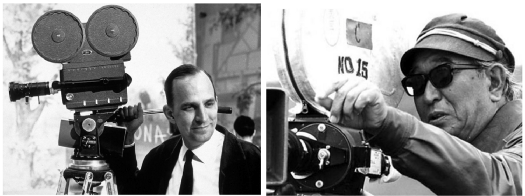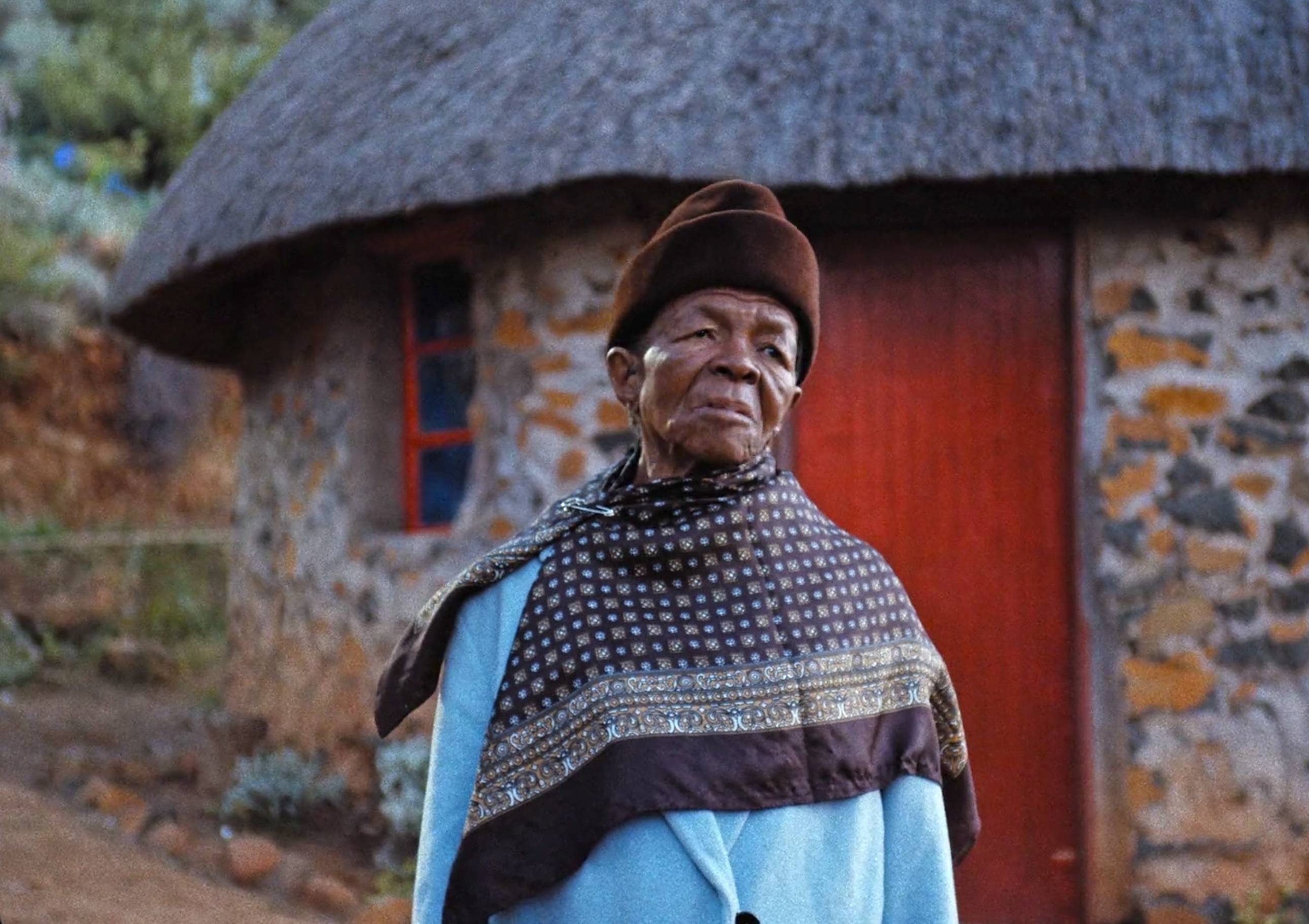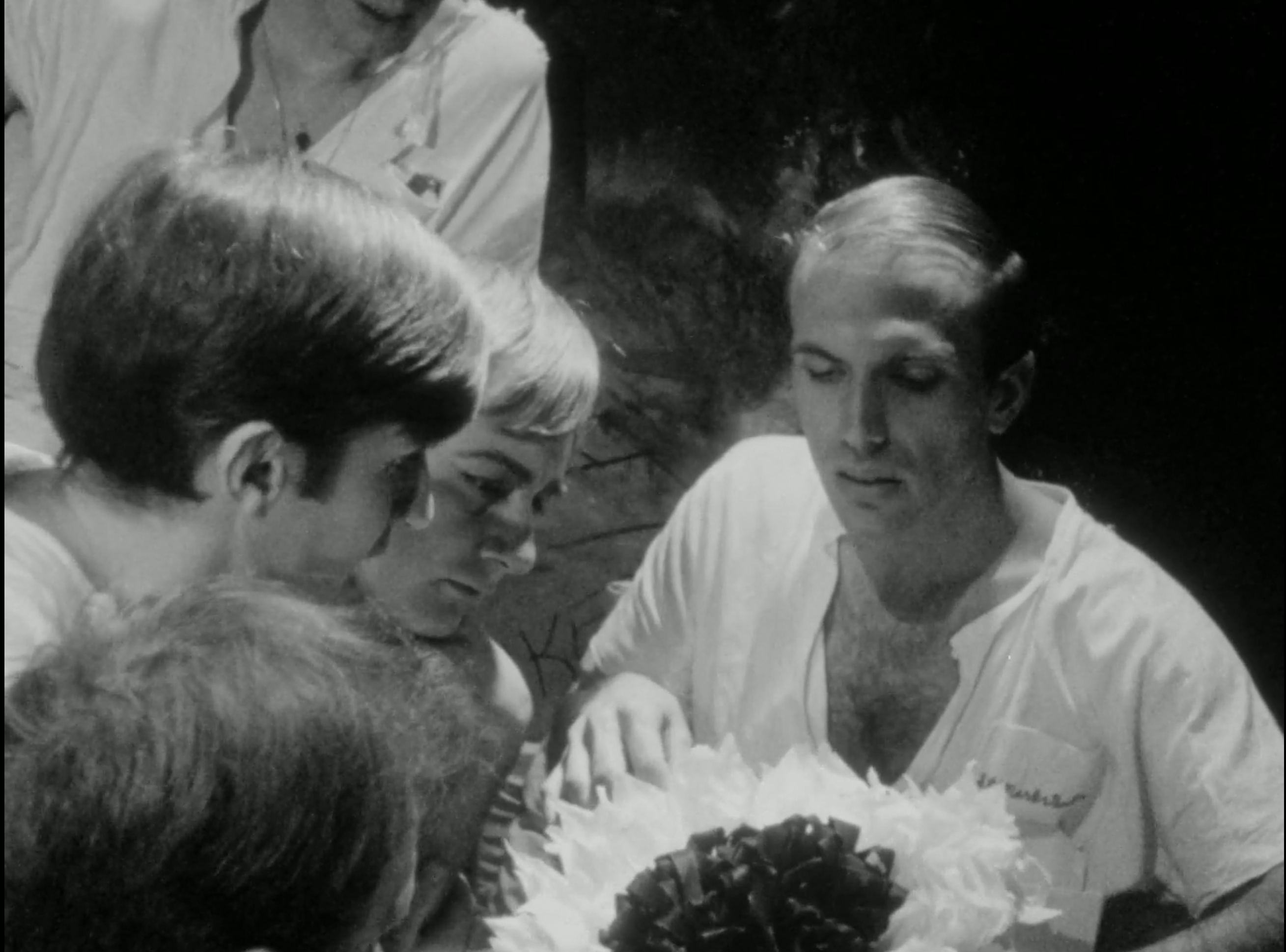
Unicórnio was filmed in a very wide aspect ratio, 2.39:1. With such a long, thin image the viewing experience is considerably different. With a more conventional ratio, there is the sense of being able to take in each frame at a glance. Even if it is an illusion a standard aspect ratio like 4:3 gives you the feeling of “normal vision.” It feels like you are simply seeing what your eyes normally see. I expect it would be difficult to gauge the area that we actually see from moment to moment. We use our eyes in conjunction with our visual cortex to approximate reality. We see a combination of what we expect to see, what is actually there, and a kind of short-term memory that lets us scan an area and expand our field of vision by remembering what is just outside our view.
In Unicórnio the camera provides a panorama that we can not fully take in. It gives the sense that you can look around the image. This is also partly due to the camera keeping its distance from its subjects. There aren’t many close-ups in the film which reinforces the sense that we the audience are observers able to choose where to look.
There are only two locations, an impossibly beautiful mountain cabin and a grubby featureless, white-tiled, room. The room looks institutional and is lit by the dull, greenish light of a bare fluorescent bulb. We abruptly move back and forth between the lush, saturated colors of the Brazilian mountains to the lifeless, shallow emptiness of the room. The two different locations fill the screen in drastically different ways. The white room is a flat wall of tiles devoid of interest. It traps whatever is in it in the static grid of its tiles whereas The landscape is an infinite scape of pastoral beauty.
The white space appears to be a stand-in for some mental or intangible place. It might be the afterlife or a dream, or a place where memories are kept. The mountains on the other hand are the location of ordinary life. It's a reversal where the fantasy world is banal and ordinary life is beautiful and romantic.

The film is slow. The camera slides slowly along tracks and lingers encouraging you to soak up details. The story is slow as well. Not much happens. The imagery is what speaks the loudest and draws in our interest.
Unicórnio is definitely influenced by Tarkovsky, but it isn’t like a Tarkovsky film. There are some specific similarities like the way the camera glides past things and there is a hair washing scene that certainly evokes The Mirror, but the overall feel is very different. Where Tarkovsky is ethereal and meditative, Nunes, the director of Unicórnio, is visually loud and ebullient. There are times when he completely gives way to sweeping, painterly images.

No full-out spoilers but getting close after this point.
The last quarter of the film is absolutely fascinating. Unicórnio starts to slowly sink into darkness, and slowly fills with dread. I went into this film blind and I am so glad I did. It takes you on a long journey through mental landscapes and memories until quietly it begins to reveal something horrible. I did not see it coming. There was some foreshadowing and I thought perhaps violence lay ahead but nothing like what actually happens.
There is a kind of Electra complex at the heart of the film where Maria, a 13-year-old girl, and her mother vie for the attention of a neighboring goat herder. When the mother first appears she seems like an older version of the daughter as if we have cut to several years later. Nunes never fully reveals anything. The story shifts under your feet.
There is almost no eroticism in the film but hints and symbols about the young girl’s emerging sexuality abound. She visits a unicorn in the forest several times. Unicorns are traditionally associated with virgins. In many myths, virgins are the only ones who can touch a unicorn or trap one. Maria sleeps with a carved wooden unicorn by her bed. Unicorns have an ironic edge to them in that they symbolize virginity but their horns give them a pronounced phallic presence.

Maria is always alone when she visits the unicorn and its presence does not challenge our sense of reality. It may be in her imagination but it does not feel out of place. Our sense of what is real is undermined in several more insidious and surprising ways.
Many films follow an arc where fantasy and reality become increasingly hard to distinguish. It’s a tried and true trope, but watching Unicórnio feels like you the viewer have made some kind of mistake. You’ve misunderstood something. It’s a feeling that builds throughout the film and in the last quarter, you realize the film is continually reshaping itself and its characters. As the film reaches toward crisis there are ominous low tones that rumble up out of the silence and then disappear. The “understated” acting starts to look more like some kind of pathology.

This is the sort of film that will stay with you. There are connections you discover and the revelations reverberate. I recently watched Jane Campion’s Power Of The Dog, and thoroughly enjoyed it, but Unicórnio has a richness that affords it a unique depth. Neither film fully resolves but Unicórnio leaves more unanswered questions and the result is unnerving. In both films, you are misled and then discover something darker than what you were expecting but Unicórnio creates a space for the audience to doubt their observations and conclusions.
Nunes made Unicórnio in 2017 in Brazil. The film was based on two poems by Brazil’s most famous and prolific poet Hilda Hilst. Before Unicórnio, Nunes had mostly made documentaries, with the exception of SouthWest. Based on the strength of Unicórnio, I will be seeing Southwest as soon as possible.

If you enjoyed this article you might also enjoy - https://filmofileshideout.com/archives/hilal-baydarovs-2020-film-in-between-dying-is-wonderful/



